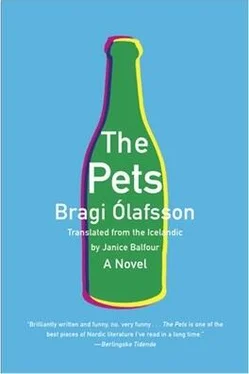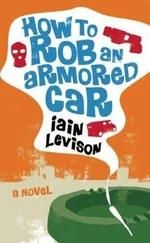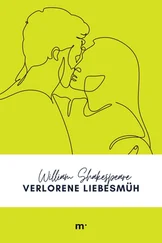Bragi Ólafsson - Pets
Здесь есть возможность читать онлайн «Bragi Ólafsson - Pets» весь текст электронной книги совершенно бесплатно (целиком полную версию без сокращений). В некоторых случаях можно слушать аудио, скачать через торрент в формате fb2 и присутствует краткое содержание. Год выпуска: 2008, Издательство: Open Letter, Жанр: Современная проза, на английском языке. Описание произведения, (предисловие) а так же отзывы посетителей доступны на портале библиотеки ЛибКат.
- Название:Pets
- Автор:
- Издательство:Open Letter
- Жанр:
- Год:2008
- ISBN:нет данных
- Рейтинг книги:5 / 5. Голосов: 1
-
Избранное:Добавить в избранное
- Отзывы:
-
Ваша оценка:
- 100
- 1
- 2
- 3
- 4
- 5
Pets: краткое содержание, описание и аннотация
Предлагаем к чтению аннотацию, описание, краткое содержание или предисловие (зависит от того, что написал сам автор книги «Pets»). Если вы не нашли необходимую информацию о книге — напишите в комментариях, мы постараемся отыскать её.
Pets — читать онлайн бесплатно полную книгу (весь текст) целиком
Ниже представлен текст книги, разбитый по страницам. Система сохранения места последней прочитанной страницы, позволяет с удобством читать онлайн бесплатно книгу «Pets», без необходимости каждый раз заново искать на чём Вы остановились. Поставьте закладку, и сможете в любой момент перейти на страницу, на которой закончили чтение.
Интервал:
Закладка:
He continues to knock, not as often as before but even louder, and I risk putting my head a little closer to the window to see if I can get a glimpse of his face. The next moment he takes several steps backwards and looks up at the building, as if he expects me to be watching him from the floor above. I still can’t see his face properly, because of the hood, but as I watch his movements — how he lifts his body and lets it slump down somehow with each step — it dawns on me.
I know who he is.
I automatically close the curtain and take several steps back from the window.
“Can it be?” I whisper to myself. “Can it really be?”
According to what I had heard, which was confirmed by his father several months ago, Havard Knutsson was kept in an institution in Sweden and should be in custody there for at least the next three years. He had only spent one year in this “so-called home,” as his father Knutur referred to it.
“Can it really be him?” I wonder and refuse to believe it. I almost feel as if I have seen a ghost, and I begin to imagine that Havard died in the institution and his ghost has started knocking on people’s doors — people who he knows wouldn’t let him enter in the flesh. But the heavy blows on the door are too realistic to allow me to pretend that he’s a ghost who would vanish when I opened the door. I try to convince myself that what I thought I saw in this man’s movements was a mistake, I had only imagined the worst; this man outside may be someone completely different from the man he appears to be. But I don’t manage to convince myself. There is only one person in the world who moves like this; it is Havard.
He grips the door knob again, then knocks several times and calls my name; he seems quite confident that I am at home. I immediately suspect that his next move will be to peep in through the mail slot, and before that can happen I decide to tiptoe across the floor, as silently as I can, and hide in the bathroom. Though it isn’t likely that he can see me behind the thick curtains, I feel completely exposed in the living room. On the way to the bathroom I see steam rising from the pot on the stove; the water for the coffee has started to boil. If Havard peeped through the kitchen window at lunchtime, I think it’s likely he’ll do it again now. I don’t hear anyone knocking, which must mean that he has gone or is standing outside the kitchen wondering how he can get in through the window. The music that I had just turned up — perhaps too high — doesn’t sound as good now as it did earlier.
There is a knock on the glass and I don’t have to wonder whether it is the kitchen or the living room window. If there is something that I am certain of at this moment, it is that Havard has noticed the pot on the stove and is standing outside the window calmly trying to decide whether he should do his old mate a favor and remove the pot from the stove or just leave it and go away. While I ask myself what I would do in his position, I can hear that he has come to the same conclusion as me; I hear the latch being lifted and know instinctively that he is forcing the window open. Without a second thought I rush from the bathroom to the bedroom. I realize that I am taking quite a risk and it is very likely that Havard has seen me; one can easily see the hall between the bathroom and the bedroom from the kitchen window. In order to see if he has come in, or if he even intends to come in, I peep as carefully as I can out of the doorway.
Now I see him properly for the first time; he has pushed down his hood and poked his head in through the open window. I notice that his hair is longer than when I saw him last, five years ago. He has a grip on the shelf above the sink and it is quite clear that he is going to heave his body through the open window. I don’t dare to look any longer; any second now he could lift up his head and I probably wouldn’t have time to draw back. Besides, it’s not safe to stand in the doorway any longer. I try to avoid being in view from the kitchen window — except perhaps for one or two seconds — as I slide cautiously into the bedroom, stand for a few seconds in the middle of the room, and try to hear what he is doing out there. He groans as he struggles, and I imagine that he has gotten stuck on the window latch or torn a hole in his anorak or pants, when he suddenly says “damn it” and some other words that are drowned by the music in the living room.
I get down on my knees without even thinking, poke my head under the bed, and pull out a box of toys that belong to my son Halldor. I then lie down on the soft carpet, squeeze my body in under the bed, and pull the sheet down to the floor — to hide myself from the doorless entrance to the bedroom and from the window that faces the dim back garden.
I still find it difficult to believe that it is actually Havard in the kitchen, that the man would even dare to visit me at all. And why on earth does he have to choose today? I thought I had seen the last of Havard Knutsson; once again I have found out how ridiculous it is to believe something in this life.
I hear a noise through Big Fun’s loud guitar playing, like something heavy falling on to the floor. There seem to be two thumps, then the window bangs shut; I think it is bound to break, but I don’t hear the sound of broken glass.
There is no doubt about it, Havard is inside. He pants, and something that he notices — I can’t imagine what — makes him exclaim with disapproval:
“What on earth is this?”
It sounds as though he is walking into the living room. I didn’t see what kind of shoes he was wearing when I looked at him from the window, but they tap on the floorboards as he walks. If I know him at all, they are patent leather shoes with pointed toes; I can’t imagine that the Icelandic winter would have any influence on the type of shoes that Havard Knutsson wears.
“What cement!” he says indignantly, and the next moment the music has been turned off. “No wonder my pal Emil can’t bear to stay at home!”
I repeat his words to myself: What cement. No wonder I can’t bear to stay at home.
Cement is, of course, one of the first words that come to mind in connection with Havard: cement in its literal meaning. I don’t know what to think about this unexpected visit. And I don’t know quite what to expect. I haven’t heard from Havard for about five years, since we sat in the kitchen on Brooke Road in Stoke Newington and I gave him four hundred pounds to go away. Go away as far as possible, much further than just out of London, preferably to another country. And he said — with a grin fueled by the two or three pints of Special Brew he had drunk before lunch — that if I could give him four hundred more then he would never show his face again.
I should have given it to him. Though there isn’t much one can be confident that Havard will do right, I believe that he would have kept that four hundred pound promise. At least he has kept his word about what would happen otherwise.
He goes back into the kitchen. I hear the sound of bubbling water die down; he must have taken the boiling water off the stove, and I presume that he has turned the gas off, though it’s not quite certain. More likely, he has just taken the pot off the heat.
2
“Hello!” Havard shouts. “Hello, Emil?” He is in the living room. I hear him move the bottles on the table, then open one of them, probably the whisky. “Is anyone at home?” he calls out. I hear the seal tear and the metallic sound when the cap is screwed off; I can hear it clearly because there is no real wall between the bedroom and the living room, just a partition through which one can hear almost everything.
“Not bad,” he says.
Now he is sniffing it. I wait for him to take a swig, to hear the splash from the fifteen-year-old whisky when the bottle is tipped up, but I don’t hear anything like it; instead he slams the bottle down on the table and the next moment his shoes echo on the hall floor.
Читать дальшеИнтервал:
Закладка:
Похожие книги на «Pets»
Представляем Вашему вниманию похожие книги на «Pets» списком для выбора. Мы отобрали схожую по названию и смыслу литературу в надежде предоставить читателям больше вариантов отыскать новые, интересные, ещё непрочитанные произведения.
Обсуждение, отзывы о книге «Pets» и просто собственные мнения читателей. Оставьте ваши комментарии, напишите, что Вы думаете о произведении, его смысле или главных героях. Укажите что конкретно понравилось, а что нет, и почему Вы так считаете.











